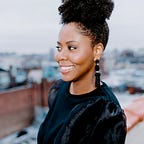Black Women Are Not Your Superheroes
The Superhuman narrative is just as dehumanizing as the Subhuman narrative.
During President Biden’s inauguration, Amanda Gorman became the youngest inaugural poet in American history. I watched on the edge of my seat as she recited her work with grace, style, confidence, and joy. This accomplished young woman has since been signed to an IMG modeling contract and is scheduled to perform at the Super Bowl. Her accomplishments deserve to be praised because her talents are immense.
However, an all-too-familiar narrative began to surface the very next day. A cartoonist, named Andy Marlette of Pensacola News Journal, posted as one of his “Cartoons of the Week”, an illustration of a superhero-esque Gorman flying through the air carrying a battered and beaten Uncle Sam. She was depicted as coming to the rescue of American democracy.
I saw the image and my heart sank. Not because Amanda should not be celebrated — because she deserves all of her flowers. But because too often, the intellectual, physical, creative, and emotional labor of black women is happily used by the collective of this country with very little given in return that isn’t simply performative in nature. Amanda Gorman is a very young woman who should be able to create her art without the added pressure of being a savior for a nation.
To put it plainly, the dynamic between America and black women much too often lacks reciprocity.
Since the beginning of this nation’s history, it has been commonplace to stereotype black women as “strong” and “able to handle it all.” An infallible, get-it-done persona that is all too often very over-simplified. While on the surface, it’s well-intentioned and seemingly done to counteract the debilitating subhuman stereotypes that have pervaded the thinking around black people in America for centuries; it is still rooted in the same racism.
The black female as the nation’s superhero falls right in line with the antiquated Magical Negress trope. She is the sister of the Magic Negro. Popularized in many television shows and films throughout the decades, these tropes are created by the racist imagination in which the black women’s sole purpose of existence is to help white people.
The Magical Negress serves to help the white protagonist get out of trouble and teaches them to become a better person.
Sounding more familiar yet?
Black women have been doing grassroots work the past four years to shift the political landscape of America. Women such as Stacey Abrams, Ayanna Pressley, and countless others have been having tough conversations and helping to register record-breaking numbers of voters all across the nation. These efforts were necessary because black women know that when push-comes-to-shove we get the short end of the stick.
All across mainstream media, the efforts of black women in the political sphere were praised for “saving” America. Black women were praised for “showing America the right path”.
I ask, however, where are these same people when asked to show out and stand up when Black Women need help? Who comes to save the “saviors”?
When black women speak on the fact that we are three to four times more likely to die from pregnancy-related complications than any other demographic in the country. Simply because our complaints of pain in a racist medical system are not taken seriously.
When black women mention that there are approximately 70,000 missing black women and girls in America, who are more than likely victims of human sex trafficking.
In addition, Black women deal with domestic abuse and sexual abuse at rates higher than the national average. We navigate the effects that pervasive misogynoir has on our mental and emotional well-being and many of us are doing it with very little support.
Where are the collective cries for corrective action and protection from anyone who isn’t a black woman?
What mainstream America may see as “superhuman strength” is really just doing the best you can every day with what you got. But the weight of it is all too real and has threatened to break the mind and spirit of many.
This is why in my immediate friend circle, we find the burden of being “strong” exhausting. Self-care has become even more crucial in our daily rituals— a mandatory essential for replenishing our souls.
The point remains that the efforts black women are being lauded for are the result of being truly in alignment with compassion. Black women’s actions are not supernatural but simply humanistic. Portraying us as “bulletproof” beings is yet another way to not fully recognize our complexities.
My wish for all black women is ease, joy, and the ability to honor themselves on the deepest level…because the only person we need to be tasked with saving in this life is ourselves.
